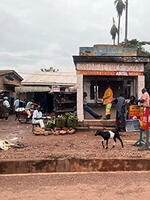Filter by...
Reset all
Publications (134)
Date
Technical Note
pdf
This technical note describes the Uganda Revenue Authority (URA) corporate income tax panel constructed from corporate income tax (CIT) returns and firm registration data for the financial years 2013/14 to 2022/23. The panel dataset contains over 300 variables, which allow the user to study, for...
Working Paper
pdf
– Evidence from Uganda
Aggressive profit shifting by multinational enterprises (MNEs) is a growing concern for domestic resource mobilization in developing economies. This paper evaluates the revenue and welfare consequences of a flagship tax avoidance rule that has been implemented in more than 45 countries to prevent...
Journal Article
This peer-reviewed research is available free of charge. UNU-WIDER believes that research is a global public good and supports Open Access.
The extent of redistribution in low-income developing countries, including in Africa, is very limited, which raises the question whether the tax rates of high-income individuals should be raised. A crucial parameter when considering a potential increase in progressivity is the response of taxable...
Technical Note
pdf
This technical note describes the Uganda Revenue Authority (URA) presumptive tax returns data covering financial years from 2015/16 to 2022/23. The data contains 21 variables, including information on taxpayers’ characteristics, turnover, and payable taxes. It covers the population of small...
Journal Article
This peer-reviewed research is available free of charge. UNU-WIDER believes that research is a global public good and supports Open Access.
COVID-19 pandemic, household welfare and diversification strategies of smallholder farmers in Uganda
Agricultural activities in many sub-Saharan African (SSA) countries are subject to various risk factors that the COVID-19 compounds. Earlier studies on the effect of COVID-19 on smallholders neglect the issue of comparison with non-farm households. The study uses micro-level household datasets to...
Report
pdf
This report documents UGAMOD, the SOUTHMOD model developed for Uganda. This work was carried out by Uganda Revenue Authority (URA) and Makerere University in collaboration with the project partners. The results presented in this report are derived using UGAMOD version 2.1, which is part of the...
Blog
Uganda, with a fiscal deficit of 5.6% in 2023, has increasingly turned to local resources to make up for its revenue shortfall since the World Bank suspended its funding on 8 August 2023 over the country’s anti-homosexuality law. In early April 2024, traders in downtown Kampala protested against...
Working Paper
pdf
– Comparing the performance of universal basic income in Uganda and Zambia during COVID-19
The debate over universal basic income (UBI) has gained traction in the developing world in recent years. We analyse the effects of four UBI schemes on poverty and inequality measures during normal times and times of crisis in Uganda and Zambia. We use static microsimulation models and nationally...
Working Paper
pdf
Cross-border traders face a choice between official and unofficial border crossings. The latter allow them to evade taxes, but expose them to other risks, such as bribes, fines, and arrest. We investigate the perceptions of cross-border traders about the risks of trading officially vs unofficially...

While multinational corporations (MNCs) make up only 1.9% of firms operating in Uganda, they are overrepresented among tax holiday beneficiaries. New estimates reveal that Uganda’s revenue losses due to these tax expenditures peaked at USD 42 million in 2020.A new dataset allows for the first...
Working Paper
pdf
This paper studies the impact of the COVID-19 pandemic on formal sector employment in Uganda. Utilizing employee-level administrative tax data from the Uganda Revenue Authority, we describe the dynamics of employment as the pandemic evolved, seeking to better understand the various coping strategies...
Technical Note
pdf
This Technical Note describes Ugandan trade data covering import and export declarations for ten calendar years from January 2013 to December 2022, constructed from transactional-level Ugandan administrative data. The trade data series contains transaction-level ten datasets on imports and ten on...

– Combining tax data and Google Street View images
The issue of tax non-compliance among businesses is pervasive in many developing economies, including Uganda. But to what extent do businesses comply with their tax obligations in the capital city, Kampala? Can the local environment and geographic information help predict the risk of tax non...

Parts of Uganda that had centralised political systems before colonial rule are more likely to have higher rates of voluntary tax compliance. Merima Ali and Odd-Helge Fjeldstad look at why that might be the case.Voluntary tax compliance is an important source for domestic revenue in Africa as the...
Working Paper
pdf
– Challenges and prospects for Uganda
This paper simulates the impact of the global minimum corporate tax rate (GMCTR) in Uganda by estimating the difference between the mechanical and the behavioural changes in tax revenue. Overall, implementation of GMCTR will increase tax revenue, and the revenue increase is inversely proportional to...
Working Paper
pdf
– Evidence from Kampala, Uganda
This paper investigates business tax compliance in a multilevel tax structure with limited coordination. We study the case of Kampala, where firms are taxed at national and local levels—by the Uganda Revenue Authority and the Kampala Capital City Authority, respectively—and where the agencies...
Working Paper
pdf
Uganda has one of the lowest corporate income tax collection rates in sub-Saharan Africa, while offering generous corporate tax incentives. It is unclear whether tax incentives achieve their objectives without primarily benefiting firms, potentially undermining domestic revenue mobilization and...
Working Paper
pdf
– A comparative perspective
We examine the distributional effects of the COVID-19 pandemic and associated tax-benefit measures in seven sub-Saharan African countries, focusing on the onset of the crisis.We evaluate impacts on disposable incomes, considering variations across income groups; assess the effectiveness of tax...
Technical Note
pdf
This technical note describes the Uganda Revenue Authority (URA) Pay-As-You-Earn (PAYE) data covering financial years 2013/14 to 2021/22. PAYE is paid by an employer who withholds personal income tax on employees’ wages and other employment incomes like benefits and allowances. The data are...
Working Paper
pdf
– Evidence from Uganda
We investigate how the arrival and expansion of mobile network access in Uganda influences firm tax behaviour. Access to mobile technologies could broaden government revenues from corporate income tax through the extensive margin: by reducing the costs of formalization, it could increase the number...
Journal Article
This peer-reviewed research is available free of charge. UNU-WIDER believes that research is a global public good and supports Open Access.
Part of Journal Special Issue
Fiscal state capacity
Working Paper
pdf
– Evidence from personal income tax reform in Uganda
We evaluate a major personal income tax reform in Uganda that came into effect in 2012–13, contributing to the scarce literature on the effects of personal income tax reform on employees’ income in a low-income country in Africa. The reform increased the tax-free lower threshold, increased tax rates...
Report
pdf
This report documents UGAMOD, the SOUTHMOD model developed for Uganda. It describes the different tax–benefit policies in place, how the microsimulation model picks up these different provisions, and the database on which the model runs. It concludes with a validation of UGAMOD results against...

– A game changer for efficient and fair taxation
In May 2022, the Uganda Revenue Authority (URA) and UNU-WIDER collaboratively launched a secure research data laboratory facility in Kampala, Uganda. The research lab is the second of its kind on the African continent in providing secure access to the revenue authority’s administrative tax data. The...
Working Paper
pdf
We study the effectiveness of social protection benefits in reducing income and consumption poverty in five sub-Saharan African countries—Ghana, Mozambique, Tanzania, Uganda, and Zambia—in normal times and times of widespread economic crisis. Using tax–benefit microsimulation models with...
Working Paper
pdf
Uganda’s post-colony continues to be haunted by the colonial logic of ethnicity. This logic has mapped the country’s post-colonial political landscape as a terrain on which spirals of ethnic-based conflicts and violence are the norm. Because colonial ethnic spatial demarcations were also unequally...
Working Paper
pdf
– Evidence from household panel data in Uganda
Empirical studies on the effectiveness of aid to the water, sanitation, and hygiene sector (WASH aid) have focused primarily on access to these services as the benchmark for evaluating the effectiveness of aid in this sector. Given the importance of WASH services for public health outcomes, the...
Report
pdf
View the latest UGAMOD country report here. This report documents UGAMOD, the SOUTHMOD model developed for Uganda. It describes the different tax–benefit policies in place, how the microsimulation model picks up these different provisions, and the database on which the model runs. It concludes with...
Technical Note
pdf
This technical note describes the Uganda Revenue Authority (URA) firm panel, which is constructed from administrative corporate income tax (CIT) returns and firm registration data for the financial years 2013/14–2019/20. The panel dataset contains over 300 variables, which allow the user to study...
Technical Note
pdf
Agricultural subsidies may have significant productive and distributional consequences, and policy-makers need to be able to assess these impacts as a part of the overall tax and benefit policy. Microsimulation models offer a tool for such analysis also in developing countries, but their coverage...

Millions of Africans lost their jobs as a result of the coronavirus pandemic, but state social security systems were of little help to people who lost their income.This is the conclusion of a study conducted by the United Nations University World Institute for Development Economics Research, UNU...
Working Paper
pdf
We use income data from tax registers at the Uganda Revenue Authority from 2011 to 2017 to estimate top income inequality, focusing on the very top—the top 1, 0.1, and 0.01 per cent of the income distribution. The focus on the extreme top is facilitated by access to population data on formal sector...
Displaying 32 of 134 results
 Join the network
Join the network